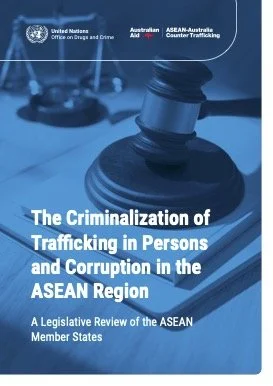The Criminalization of Trafficking in Persons and Corruption in the ASEAN Region. A Legislative Review of the ASEAN Member States
By Joseph Lelliott
Previous research by the United Nations Office on Drugs and Crime (UNODC) and others has shown that trafficking in persons could not occur on a large scale without the aid of corruption. Corruption facilitates all stages of trafficking, from the initial recruitment of victims through to situations of exploitation themselves. It also hinders effective investigation, prosecution, and punishment of perpetrators and allows traffickers to operate with impunity.
This report, developed through the partnership between ASEAN-Australia Counter Trafficking and UNODC Regional Office for Southeast Asia and the Pacific, examines how trafficking in persons and corruption legislation in ASEAN Member States (AMS) criminalises corruption as a facilitator of trafficking. It aims to identify current linkages between trafficking in persons and corruption in the criminal provisions of AMS legislation and highlights potential ways for provisions to be applied in practice to punish corruption that facilitates trafficking.
Trafficking in persons is of major concern throughout Southeast Asia, including in the ten ASEAN Member States. Evidence strongly indicates that various types of exploitation are widespread in the region. Previous research by UNODC and others has shown that trafficking in persons could not occur on a large scale without the aid of corruption. Corruption facilities all stages of trafficking, from the initial recruitment of victims through to situations of exploitation themselves. It also hinders the effective investigation, prosecution, and punishment of perpetrators and allows traffickers to operate with impunity. This report examines how trafficking in persons and corruption legislation in ASEAN Member States criminalizes corruption as a facilitator of trafficking. It has two aims: 1. To identify current linkages between trafficking in persons and corruption in the criminalization provisions of ASEAN Member States’ legislation. 2. To highlight how trafficking and corruption criminalization provisions can be applied in practice to punish corruption that facilitates trafficking.
Bangkok, Thailand: United Nations Office for Drugs and Crime (UNODC), Regional Office for Southeast Asia and the Pacific, 2025. 142p.


